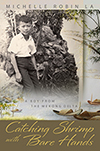I touch Grandfather’s arm. He still feels warm. I look for him to make the slightest motion to show his soul is around. There’s nothing.
Two men place the coffin on sawhorses so that Grandfather’s head points west. The dead always face the setting sun.
The date the monks said would be best for burying Grandfather is two days away. All day and night, the monks chant by his coffin. At night I lie and listen to the soft keng of the bell and cóc cóc of the wooden drum as a monk chants and prays next to Grandfather. A sweet, decaying smell mixed with incense drifts up to us. Vân rolls over on his mat. “They better bury him soon. . . . He stinks.”
Má says the smell is bad for you because if a person is freshly dead their soul might come and try to take possession of you. A flurry of scissors snip cloth for our funeral clothes. Relatives of the deceased wear white to cleanse the soul—acknowledging the afterlife.
Grandfather’s spirit stays around like a shadow. If you leave your food out, it tastes bland because his spirit ate the essence out of it. If the steam from a new pot of rice goes against the wind, Grandfather’s spirit is inhaling it.
Ba hangs Grandfather’s picture above the bookcase altar. Every evening, my brothers and I take food upstairs to the altar. We place our hands together and bow three times. Then, we invite Grandfather to eat just like we did when he was alive.
(modified excerpt from Catching Shrimp with Bare Hands)




